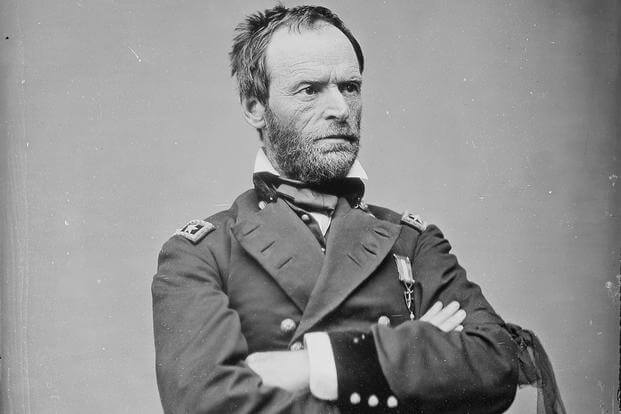Like Gilbert and Sullivan's Maj. Gen. Stanley, William Tecumseh Sherman was the "very model of a modern major general." The Union commander developed many of the ideas on which contemporary warfare is based and incorporated them into the curriculum when he founded a school for officers at Fort Leavenworth, Kansas, in 1881.
However, the West Point graduate didn't always seem a likely choice for fame. Sherman's career history was as hilly as the streets in his first post-service home of choice, San Francisco. After leaving the military academy in 1840 without qualifying for the corps of engineers, the young officer fought without distinction in the Seminole and Mexican Wars, then resigned his commission. In California, he became a partner in a bank, by all accounts managing it well through the gold rush's devastating fiscal aftermath.
When the Civil War began, Sherman was superintendent of the Louisiana Military Seminary (today's Louisiana State University). While he enjoyed living in the South with many of his former military comrades, Sherman's personal feelings were reflected in the motto of the seminary: "the Union -- esto perpetua [be eternal]." Vowing to support the Union at all costs, Sherman resigned his post, moved his family to Ohio and offered his services to the secretary of war. On June 20, 1861, he was given the rank of colonel in the 13th Regular Infantry.
After a rout at Bull Run reinforced Sherman's already low opinion of his volunteers, he was given command of the Department of the Cumberland. A War Department report labeled his request for 200,000 men to take Kentucky "insane" -- an unfortunate choice of words that led to press reports that Sherman himself was crazy. According to some sources, he may have had a nervous breakdown around this time, but rumors of insanity dogged Sherman for some time.
He performed well at Shiloh and was promoted to major general of volunteers after that battle, but he failed to seize Vicksburg. Still, in 1862, he was promoted to brigadier general in the regular Army and won the Battle of Chattanooga before capturing Atlanta.
Now, as supreme commander of the Armies in the West, Sherman embarked on his 1864 "March to the Sea" on Nov. 16, 1864. He employed his concept of "total war" across Georgia, hoping the destruction would lower southern morale and thus bring the war to a faster end. "Those who brought war into our country deserve all the curses and maledictions a people can pour out," he wrote to Atlanta Mayor James Calhoun.
The man to whom we attribute the phrase "War is hell" never finished his march, because the war ended in April 1865. After a promotion to lieutenant general in 1865, Sherman was given the rank of full general and command of the entire U.S. Army in 1869. Retiring in 1883, he settled in New York City, where he died on Feb. 14, 1891.
Want to Know More About the Military?
Be sure to get the latest news about the U.S. military, as well as critical info about how to join and all the benefits of service. Subscribe to Military.com and receive customized updates delivered straight to your inbox.















